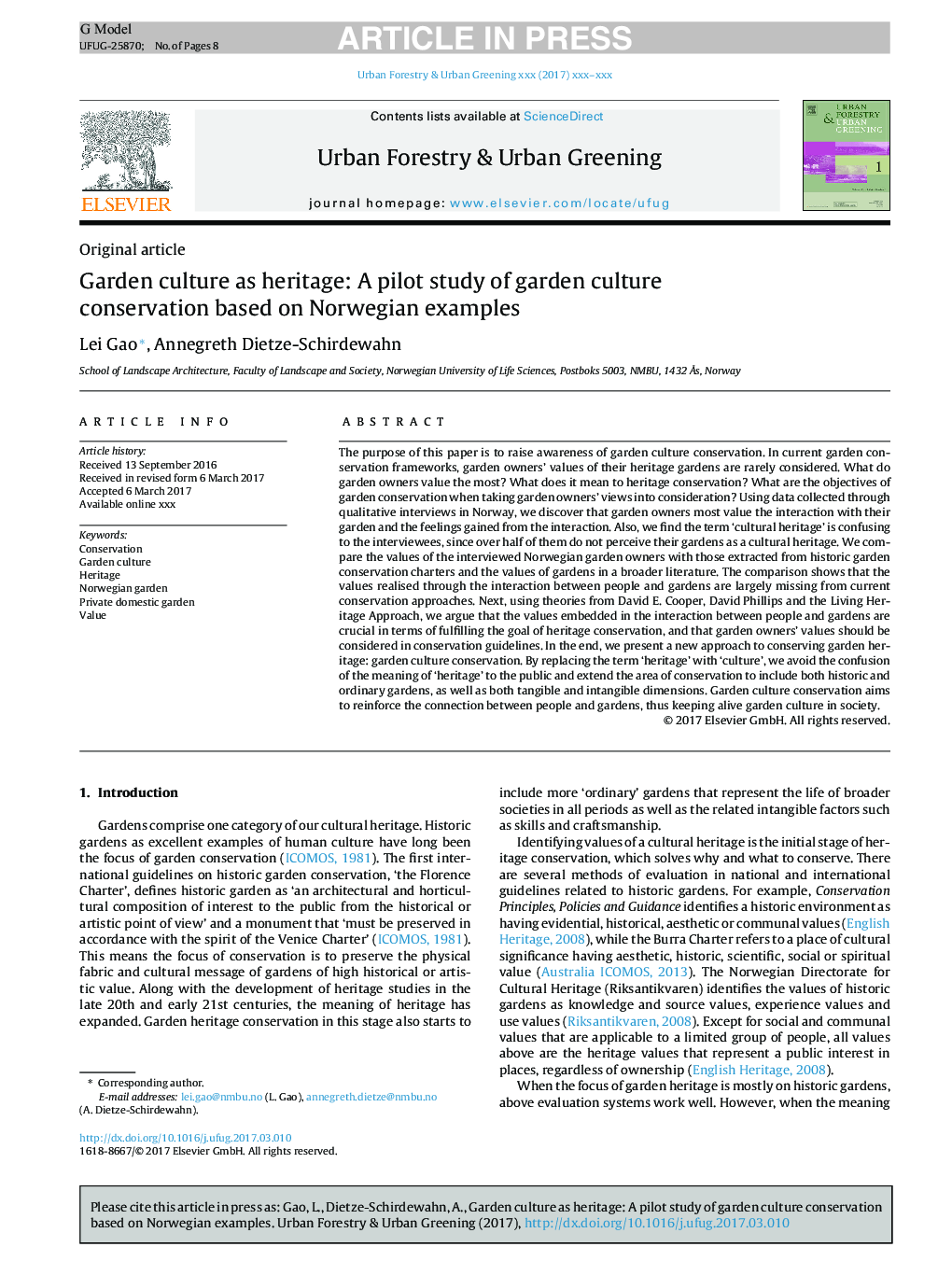| کد مقاله | کد نشریه | سال انتشار | مقاله انگلیسی | نسخه تمام متن |
|---|---|---|---|---|
| 6549311 | 1421860 | 2018 | 8 صفحه PDF | دانلود رایگان |
عنوان انگلیسی مقاله ISI
Garden culture as heritage: A pilot study of garden culture conservation based on Norwegian examples
ترجمه فارسی عنوان
فرهنگ باغی به عنوان میراث: یک مطالعه آزمایشی حفاظت از فرهنگ باغبانی بر اساس نمونه های نروژی
دانلود مقاله + سفارش ترجمه
دانلود مقاله ISI انگلیسی
رایگان برای ایرانیان
کلمات کلیدی
حفاظت، باغ فرهنگ، میراث، باغ نروژی، باغ خصوصی خصوصی، ارزش،
ترجمه چکیده
هدف این مقاله افزایش آگاهی از حفاظت از فرهنگ باغبانی است. در چارچوب های محافظت شده در حال حاضر، ارزش باغداران باغ های میراث آنها به ندرت مورد توجه قرار می گیرد. صاحبان باغ بیشترین ارزش را دارند؟ این به معنای حفاظت از میراث چیست؟ اهداف حفاظت از باغ ها در هنگام در نظر گرفتن نظرات صاحبان باغ ها چیست؟ با استفاده از داده های جمع آوری شده توسط مصاحبه های کیفی در نروژ، ما کشف می کنیم که صاحبان باغ بیشترین تاثیر متقابل را با باغ و احساسات حاصل از تعامل دارند. همچنین ما می بینیم که واژه "میراث فرهنگی" مصاحبه شونده گیج کننده است، زیرا بیش از نیمی از آنها باغ های خود را به عنوان یک میراث فرهنگی درک نمی کنند. ما مقادیر صاحبان باغبان نروژی مصاحبه با کسانی که از چارچوب حفاظت تاریخی باغ و مقادیر باغ در ادبیات گسترده تر استفاده می کنند مقایسه می کنیم. این مقایسه نشان می دهد که ارزش هایی که از طریق تعامل بین مردم و باغ ها به دست می آید از روش های حفاظت فعلی از دست رفته است. بعد، با استفاده از نظریه های دیوید ای. کوپر، دیوید فیلیپس و رویکرد میراث زندگی، ما استدلال می کنیم که ارزش های تعامل بین مردم و باغ ها از لحاظ رسیدن به هدف حفاظت از میراث حیاتی است و ارزش های صاحبان باغ ها باید در دستورالعمل های حفاظت در نظر گرفته شود. در نهایت، ما یک رویکرد جدید برای حفظ میراث باغی ارائه می دهیم: حفاظت از فرهنگ باغبانی. با تعویض اصطلاح "میراث" با "فرهنگ"، ما از آشفتگی معنای "میراث" به مردم جلوگیری می کنیم و زمینه حفاظت را گسترش می دهیم تا شامل باغ های تاریخی و عادی و همچنین ابعاد ملموس و غیرمترقبه باشد. حفاظت از فرهنگ باغبانی به منظور تقویت ارتباط بین مردم و باغ ها، در نتیجه حفظ فرهنگ درخت زندگی در جامعه است.
موضوعات مرتبط
علوم زیستی و بیوفناوری
علوم کشاورزی و بیولوژیک
جنگلداری
چکیده انگلیسی
The purpose of this paper is to raise awareness of garden culture conservation. In current garden conservation frameworks, garden owners' values of their heritage gardens are rarely considered. What do garden owners value the most? What does it mean to heritage conservation? What are the objectives of garden conservation when taking garden owners' views into consideration? Using data collected through qualitative interviews in Norway, we discover that garden owners most value the interaction with their garden and the feelings gained from the interaction. Also, we find the term 'cultural heritage' is confusing to the interviewees, since over half of them do not perceive their gardens as a cultural heritage. We compare the values of the interviewed Norwegian garden owners with those extracted from historic garden conservation charters and the values of gardens in a broader literature. The comparison shows that the values realised through the interaction between people and gardens are largely missing from current conservation approaches. Next, using theories from David E. Cooper, David Phillips and the Living Heritage Approach, we argue that the values embedded in the interaction between people and gardens are crucial in terms of fulfilling the goal of heritage conservation, and that garden owners' values should be considered in conservation guidelines. In the end, we present a new approach to conserving garden heritage: garden culture conservation. By replacing the term 'heritage' with 'culture', we avoid the confusion of the meaning of 'heritage' to the public and extend the area of conservation to include both historic and ordinary gardens, as well as both tangible and intangible dimensions. Garden culture conservation aims to reinforce the connection between people and gardens, thus keeping alive garden culture in society.
ناشر
Database: Elsevier - ScienceDirect (ساینس دایرکت)
Journal: Urban Forestry & Urban Greening - Volume 30, March 2018, Pages 239-246
Journal: Urban Forestry & Urban Greening - Volume 30, March 2018, Pages 239-246
نویسندگان
Lei Gao, Annegreth Dietze-Schirdewahn,
